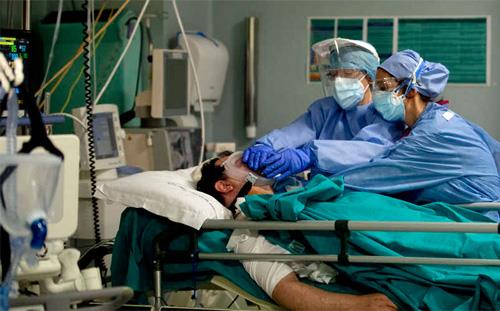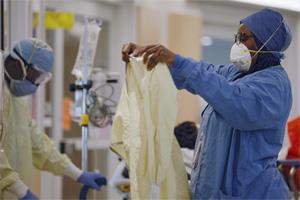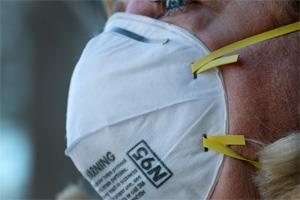
A whole lot of folks, presumably, are almost as saturated with COVID-19 coverage on television as they are by the restrictions COVID-19 has laid on them in real life.
As we start to reopen, though, it’s not a bad time for television to recap how we got from the normal world with which we started 2020, to where we are at the year’s halfway point.
PBS’s Frontline takes up that challenge Tuesday (June 16) at 9:30 p.m. ET (check local listings) with The Virus: What Went Wrong?
The Virus methodically tracks our collective response from the time COVID-19 was first identified in Wuhan, China, to the present moment. It doesn’t get distracted by conspiracy theories or partisan spin.
It sticks closely to its explanatory mission: Here’s what the experts said, and here’s what we did, and here’s how it worked out.
The frustrating part is that it soon becomes clear 90-minutes isn’t enough time to summarize this story. Straightforward as it seems in many ways, it spawned so many nuances that a short wrap-up at this point may be impossible.
 The Virus goes into some depth, for instance, on the belated and inadequate response by countries like China and, later, Italy. These cautionary tales, it seems clear, could and should have informed America’s response.
The Virus goes into some depth, for instance, on the belated and inadequate response by countries like China and, later, Italy. These cautionary tales, it seems clear, could and should have informed America’s response.
At the same time, it hardly mentions the responses of other countries like New Zealand and Sweden, which took different paths and experienced different outcomes.
When the history of COVID-19 is written, it will include those approaches and the lessons they imparted.
The Virus is produced by two journalists, Martin Smith and Marcela Gaviria, who have covered the story almost from its inception. They bring both perspective and a geographic understanding of how COVID-19 became a global concern.
For its origin story, back in China, they skip over most of the medical side and focus on the government’s response, which began with an ill-advised denial that lasted for several weeks until it could no longer be plausibly maintained.
By the time the Chinese started to lock down in January, its lethal spread had already permeated the country. Equally significant, travelers from China had exported the virus around the globe.
Two months later, Smith and Gavinia and their experts say, the United States made the same mistake. Both President Donald Trump and his chief medical advisor, Dr. Anthony Fauci, are seen here assuring Americans in late January -- when they could have gotten ahead of the virus -- that it was no big deal.
Over the next few weeks, as Dr. Fauci was changing his assessment, medical experts who disagreed with the original reassurance were ignored or pushed aside. It wasn’t until a month later, after COVID-19 concerns triggered a massive slide on Wall Street, the federal government began to act as if this were serious.
 Even then, The Virus notes, a reporter who asked President Trump what he would tell worried Americans got the response, “I’d tell them you’re a terrible reporter.”
Even then, The Virus notes, a reporter who asked President Trump what he would tell worried Americans got the response, “I’d tell them you’re a terrible reporter.”
The Virus runs through the problems with equipment availability and procurement. It talks to a nurse whose mother died alone in the hospital because no one was permitted to see her.
It does not spend a lot of time on hospital scenes, focusing more on policy responses. It talks to both critics and defenders of those policies with defenders saying they did what they thought was best with the information they had at the time.
The Virus also offers little speculation on the path from here. The impact of reopening the country and projections about a potential second wave of infections are left for others.
The mission here is to summarize what actually did happen and, toward that end, The Virus wraps by citing the recent report that a faster lockdown could have prevented more than 80% of COVID-19 deaths.
Whether the country would have been as compliant with quarantining before there was evidence of high death tolls and overwhelmed hospitals may remain another open question.
The Virus sticks to: Here’s what we did, and here’s how it worked out. Perhaps the underlying message is that it’s a lesson we need to remember, not a nightmare we should try to forget.